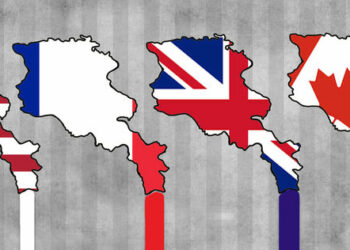Politics
Pashinyan’s War
Nerses Kopalyan writes that Prime Minister Nikol Pashinyan’s declaration of war against the entrenched powers of the previous system is not simply a singular attack against corruption, but rather a broad multi-pronged strategy that envisions an ideational restructuring of Armenia’s political culture.
Human Rights-Based Approaches in Practice: The Armenian Context
Upholding the dignity and rights of each individual is the main function of any democratic state. The change in power as a result of the revolution and the assumption of the office of prime minister by Nikol Pashinyan with the agreement and affirmation of wide segments of society put into motion the formation of a new social contract.
What Can go Wrong: Internal and External Threats to the Armenian Revolution
In this second of a two-part series, Mikayel Zolyan looks at the external threats to the Armenian revolution. He writes that while security concerns continue to be real, the Armenian government and society need to make sure that the government system is well-functioning and ready to face external challenges.
Armenia-Diaspora: The Conservative and the Revolutionary
In this first piece for EVN Report, Vicken Cheterian examines how Armenia-Diaspora relations will be impacted by dramatic changes in the country’s political landscape following the “Velvet Revolution” and whether it will be possible to revolutionize those relations.
Aggressive Centrism: Navigating the Contours of Nikol Pashinyan’s Political Ideology
Policies of previous administrations were not shaped by ideology, but rather, by a drive to consolidate illegitimate power through patronalistic politics. Nerses Kopalyan argues that the political ideology of Nikol Pahsinyan’s new government is aggressive centrism.
What Can Go Wrong: Internal and External Threats to the Armenian Revolution
In the first of a two-part series, Mikayel Zolyan looks as the internal threats facing Armenia’s new government following the Velvet Revolution - the continued resistance of the remains of the ancien régime and potential radicals within the revolutionary camp.
Youth in Power: The Fourth Wave of Armenia’s Political Elite
The traditional cautionary question is often heard in Armenia: “How is it possible, in this state of war, to entrust governance to inexperienced people?” Suren Manukyan looks at the question of youth over the four waves of Armenia’s political elite starting from the Karabakh Movement.
Political Suicide: An Autopsy of the Sargsyan Administration and the Endurance of Armenia’s Institutions
Dr. Nerses Kopalyan applies two conceptual frameworks from political science - prospect theory and historical institutionalism - to understand how Serzh Sargsyan’s Administration collapsed in the face of an unprecedented popular uprising in Armenia.
Oligarchies and Strategic Danger to Small-State Security
While some large-state oligarchies can be operationally benign to citizens, the multidimensional social and economic conditions resulting from small-scale oligarchy creates an inherent danger to national security. The state must free its captive markets by allowing equal treatment under the law for all competitive ventures.
Why is Women’s Representation in Armenia’s Government More Relevant Today?
Including more women in government isn’t just about numbers, but to ensure a broad representation. Lara Cholakian writes that this doesn’t necessarily mean that women political decision-makers will always raise issues that are relevant or important to women, or that male political leaders will always exclude them.












